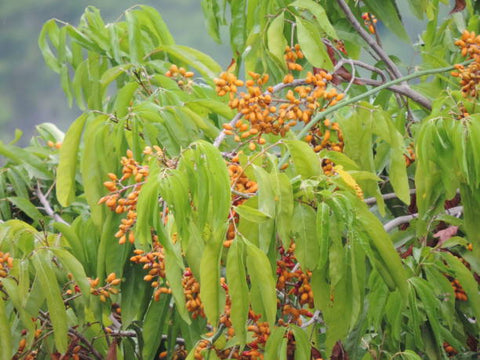Malkangani, scientifically known as Celastrus paniculatus, is a revered herb in Ayurvedic medicine, recognized for its multifaceted medicinal properties. It has a rich history of traditional use, particularly in India. In this article, we will explore the characteristics, traditional applications, potential health advantages, and any associated side effects of Malkangani.
Introduction to Malkangani
Malkangani is a climbing shrub native to the Indian subcontinent, predominantly found in regions like the Western Ghats and the foothills of the Himalayas. It belongs to the Celastraceae family and is known by various names, including Jyotishmati, Intellect Tree, and Black-Oil Plant.
The seeds of Malkangani are the most prized and frequently used part of the plant. These seeds contain a variety of bioactive compounds that contribute to their medicinal properties, including sesquiterpenes, alkaloids, and fatty acids.
Traditional Uses
Malkangani has been a cornerstone of traditional medicine systems for centuries, offering a wide range of applications:
1. Cognitive Health
- Memory Enhancement: Malkangani is renowned for its potential to enhance memory, cognitive function, and concentration. It is often used to support mental clarity and alertness.
2. Stress and Anxiety
- Stress Reduction: The herb is traditionally used as an adaptogen, helping the body adapt to stress and reduce its negative effects.
- Anxiety Management: Malkangani is believed to have anxiolytic (anxiety-reducing) properties, making it valuable for individuals dealing with anxiety disorders.
3. Neurological Health
- Neuroprotective Effects: It is used to protect and nourish the nervous system, potentially benefiting individuals with neurological conditions.
4. Digestive Health
- Gastrointestinal Relief: Malkangani can alleviate digestive discomfort and help with issues like indigestion and flatulence.
5. Rheumatism and Arthritis
- Anti-inflammatory: It is believed to have anti-inflammatory properties and may provide relief to individuals suffering from rheumatism and arthritis.
Modern Applications
Malkangani's traditional uses have found resonance in modern herbal medicine, leading to its incorporation into various formulations and supplements.
Health Benefits
Malkangani offers a spectrum of potential health benefits, largely attributed to its bioactive constituents:
1. Cognitive Enhancement
- Memory Boost: Malkangani's memory-enhancing properties may support better recall and cognitive performance.
2. Stress and Anxiety Reduction
- Stress Management: Its adaptogenic qualities can help the body cope with stress and maintain equilibrium.
- Anxiety Relief: Malkangani's anxiolytic effects may provide a sense of calmness and relaxation.
3. Neurological Support
- Nervine Tonic: It is traditionally used as a nerve tonic, promoting overall neurological health.
4. Anti-inflammatory Effects
- Inflammation Reduction: Its potential anti-inflammatory properties can be beneficial for managing inflammatory conditions.
Potential Side Effects
When used responsibly and in accordance with traditional practices, Malkangani is generally considered safe for most individuals. However, excessive or improper use may lead to side effects, including:
- Digestive Distress: Overconsumption may result in gastrointestinal discomfort, such as nausea and diarrhea.
- Skin Irritation: Applying Malkangani oil directly to the skin may cause irritation or allergic reactions in some individuals.
As with any herbal remedy, it is crucial to use Malkangani judiciously, especially if you have specific health conditions or are pregnant, nursing, or taking medications. Consulting a healthcare professional or Ayurvedic practitioner is advisable before incorporating it into your wellness routine.
Conclusion
Malkangani's remarkable properties, steeped in centuries of traditional use and increasingly supported by contemporary research, underscore its significance in holistic well-being. When used thoughtfully and mindfully, Malkangani can be a valuable ally in the pursuit of mental clarity, stress resilience, and overall health.
Author: Nikita Vishnoi BCA
Reviewe by: Dr. S Satsangi











